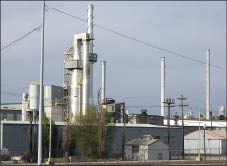
Home » Part of Kaiser plant may reopen
Part of Kaiser plant may reopen
Ohio-based aluminum maker agrees tentatively to buy smelter property

May 20, 2010
Ormet Corp., a Hannibal, Ohio-based aluminum producer, says it has agreed tentatively to buy the shuttered former Kaiser Aluminum Corp. Mead Works smelter and plans to reopen the carbon anode facility there if it completes the purchase.
That facility, which occupies a fraction of the sprawling smelter property, likely would reopen within a year, after Ormet does some startup work there, and would employ 75 to 100 people in full-time, well-paying jobs, says Mike Griffin, Ormet's vice president of operations. All of the workers needed to staff the facility would be hired locally, he says.
Griffin declines to provide details on the financial terms of the transaction, since it hasn't been completed yet. The company said in a press release announcing the tentative agreement that it expects to make a final purchase decision near the end of the second quarter after completing a due-diligence evaluation of the property, which is located at 2111 E. Hawthorne Road.
Ormet hasn't decided yet what it would do with the rest of the cavernous former Kaiser factory or the nearly 180 acres of land that also would be included in the transaction, Griffin says. St. Louis-based Commercial Development Co., an industrial property purchaser and asset salvager, bought the smelter from Kaiser in U.S. Bankruptcy Court for $7.4 million in 2004, and since then has been selling off equipment and materials there. Griffin says the big buildings that formerly housed the plant's seemingly endless rows of smelting pots now are empty.
CDC decided, though, not to dismantle the carbon anode facility, believing it was worth more intact than if sold off in pieces. Kaiser had spent about $61 million in the 1990s to upgrade and modernize that facility, and Spokane-based CDC Site Manager Greg Paolino told the Journal just a few months after that company had bought the smelter that CDC hoped to sell the carbon plant to a company that would restart it.
If Ormet buys the property, it would use the facility there to supply its smelting operation in Ohio with carbon anodes. The anodes essentially are large electrodes used in aluminum production, Griffin says. They distribute electrical current into the pots within which molten aluminum is made, and about 70,000 of the anodes were being used every month in the Mead Works' potlines in the early 1990s. Kaiser made anodes here weighing about 420 pounds each, but Ormet would produce anodes weighing close to 800 pounds each, Griffin says.
"We use a slightly different configuration from what Kaiser was doing, but it still fits very well for the facility," and would require minimal modifications here, he says.
Ormet's Web site says the company has been buying anodes from overseas suppliers since 2001, when a carbon plant at its Hannibal smelter closed for regulatory compliance reasons. Griffin says the company currently is buying all of its anodes from China, but producing them in the U.S. would save the company a considerable amount of money.
"The advantage of this is we produce our own," he says. "That's why it's a good story. It's offsetting Chinese imports."
In the press release, Ormet said, "The Mead carbon plant has the potential of supplying part of or nearly all of the anode needs for Ormet depending on the amount of capital invested." It said the plant "would allow the company greater flexibility in the sourcing of this key raw material since the company could balance internal production versus import requirements, based on price, quality, and risk."
Mike Tanchuk, Ormet's president and CEO, said in the release, "Carbon anodes are a strategic raw material for our operation. Developing a domestic source would allow us to fully recycle carbon residues, reduce our cost, and better control price risk depending on global market conditions."
Ormet employs about 1,000 people, Griffin says. Its smelter in Hannibal has an annual capacity of 260,000 metric tons of aluminum a year, and an alumina plant it operates in Burnside, La., can produce more than 600,000 tons of metallurgical-grade alumina annually, the company's Web site says. Alumina is the main ingredient used to make aluminum.
The company reported 2010 first-quarter net income of $211,000, or 5 cents a share, down from $9.6 million, or 57 cents a share, in the year-earlier period. It said the latest quarterly results included one-time charges of $5 million for debt refinancing and nonrecurring income of $3.2 million associated with a legal dispute settlement.
It said its net sales from continuing operations for the latest quarter were $100.2 million, down from $126.5 million in the year-earlier period.
Ormet, which has been in the alumina and aluminum production business since 1956, has endured its own share of financial and management turmoil. It filed for Chapter 11 reorganization in U.S. Bankruptcy Court in 2004, then exited bankruptcy the following year, with former creditors led by an asset-management company becoming shareholders under the approved reorganization plan, its Web site says. A turnaround specialist was named interim CEO of the company in 2006, and Tanchuk was part of a new management team put in place the following year, it says.
Paolino, still overseeing the Mead Works smelter property for CDC, declined to talk about the tentative sale, referring all questions to Griffin. CDC specializes in buying abandoned industrial properties, most often ones with environmental problems or other impairments, and salvaging the properties' remaining assets and marketing them for new uses.
Kaiser Aluminum once was one of the Spokane area's largest employers, with an annual payroll of more than $150 million here in the mid-1990s.
Stagnant aluminum prices and rising power costs led Kaiser to close the smelter, along with one it operated in Tacoma. Kaiser filed for protection from creditors in U.S. Bankruptcy Court in 2002. It still operates the Trentwood rolling mill.
Latest News
Related Articles



